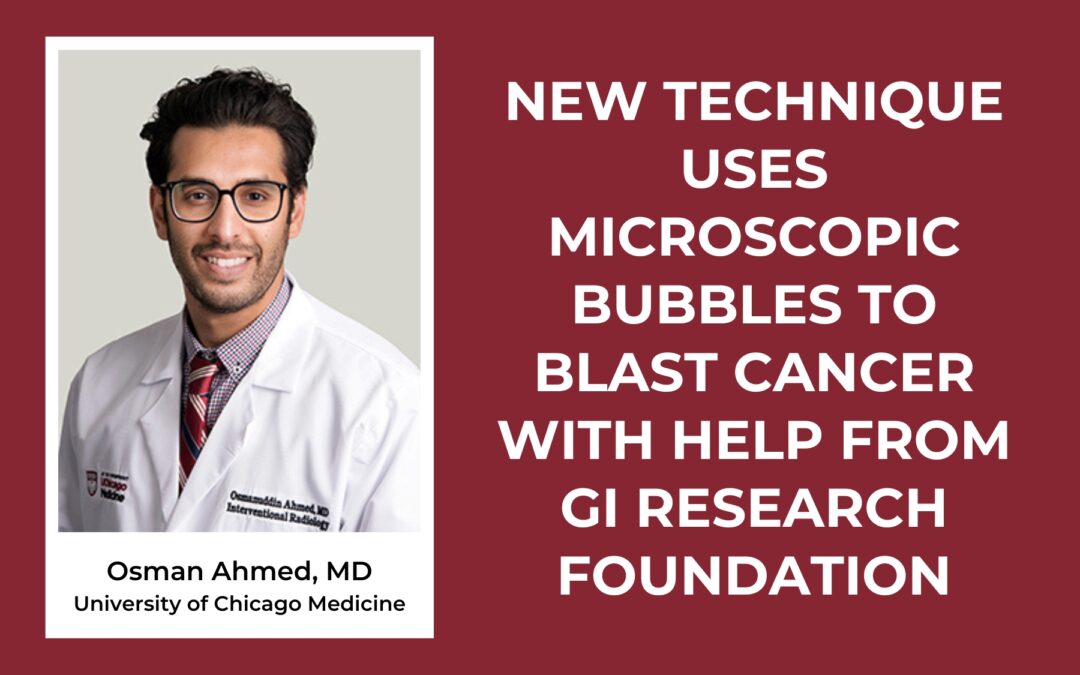With a $500,000 grant from the GI Research Foundation to Dr. Osman Ahmed, UChicago Medicine will be one of only four hospitals using a new technique to noninvasively treat liver cancer.
CHICAGO, January 9, 2024, Newswire – Bubbles make any kid’s day better. Now they’re improving the lives of cancer patients at the University of Chicago’s medical center as well.
Dr. Osman Ahmed and his colleagues received a new ultrasound device last week. It uses the gases naturally present in human tissue to create tiny micro-bubbles that mechanically break up liver cancer tumors, a process called histotripsy. The “Edison Histotripsy System,” from the company HistoSonics, recently received approval from the U.S. Food and Drug Administration.
UChicago Medicine’s Edison is among the first four deployed in the world. It was funded by a $500,000 grant from the GI Research Foundation through its CA CURE initiative. CA CURE is the largest funding program in the foundation’s history, and it provided nearly $20 million in support last year to advance the understanding, diagnosis, and treatment of gastrointestinal cancers.
“Histotripsy is a new category of treatment,” said Ahmed, an interventional radiologist and Associate Professor at the University of Chicago.
“Minimally invasive treatment becomes noninvasive treatment. No surgery. No needle. A really fancy ultrasound – the same technology used to look at a baby in utero – is used to blast tumor cells. It lowers risk and reflects every patient’s desire not to have something invasive.”
The Edison Histotripsy System includes a computer-guided robotic arm with multiple ultrasound transducers on it, both for imaging and delivering the therapy. During treatment, Dr. Ahmed will be able to visualize the patient’s liver, precisely zero in on the tumor, and use the same device to hit the tumor with thousands of pulses of sonic energy. Those pulses will induce bubbles only a few millimeters in diameter – the size of an individual grain of rice. The creation and movement of those bubbles will break up the tumor and leave nothing but completely liquified and destroyed cells to be naturally absorbed by the body.
The pulses are very precise, and the bubbles dissipate nearly instantly when the treatment is stopped. That means there are no burns or unwanted damage often caused by thermal or radiation treatments.
“This world would look very different without physicians like Os and his team,” said Mike Blue, CEO of HistoSonics. “True innovators want to offer the most recent and up-to-date treatment options for the patients they care for, and, without them, new technologies would never make it to the people who need it the most.”
The Edison Histotripsy System is currently approved for use with liver tumors, and treatment will initially focus on patients with particular types of tumors. It will likely be used for treatments of many other gastrointestinal and abdominal cancers in the future, Ahmed said. Funding from the GI Research Foundation, allows him and UChicago Medicine to stay at the cutting edge of those treatments.
“We probably wouldn’t have access to this technology for years without support of the GI Research Foundation,” he said. “The rate-limiting step is always getting the funding, which is momentum lost. This process only took a few months and was seamless. I’m still pinching myself – like it’s too good to be true.”
“The GI Research Foundation has a legacy of funding high risk-high reward and innovative science, and doing so efficiently and extraordinarily effectively. Dr. Ahmed and his colleagues are one of the multiple beneficiaries of CA CURE, a dedicated campaign that we launched in 2022 to tackle the most difficult challenges of colorectal cancer,” said Dr. David Rubin. Rubin is the Joseph B. Kirsner Professor of Medicine and Chief of the Section of Gastroenterology, Hepatology and Nutrition at University of Chicago Medicine. He is also GI Research Foundation’s Senior Scientific Advisor.
According to Katie Chudnovsky, chair of the foundation’s Board of Directors, “This quick, high-impact funding is exactly the way we want to operate. Our rigorous scientific review process, tremendous team, and deep connections to the University of Chicago are such a powerful combination, and we’re going to see the benefits of that combination with Dr. Ahmed’s patients very soon.”
About the GI Research Foundation
The GI Research Foundation was founded in 1961 by grateful patients and friends of the late Dr. Joseph B. Kirsner, a pioneer in gastroenterology who devoted his life to medicine, teaching, and patient care. Today, the University of Chicago Medicine’s Digestive Diseases Center, which is supported by the foundation, is internationally recognized for research-driven medicine and its team of highly specialized physicians. For more information, see: https://giresearchfoundation.org/
About the University of Chicago Digestive Diseases Center
The Digestive Diseases Center at the University of Chicago Medicine is a collaborative, multidisciplinary network of physicians, researchers, and affiliated health professionals who share a legacy of innovation and a common purpose: to improve the lives of patients who suffer from digestive diseases. For more information, see: https://www.uchicagomedicine.org/conditions-services/digestive-diseases
Contact Information
Jackie Casey
Executive Director
jcasey@girf.org
312-332-1350
SOURCE: GI Research Foundation

